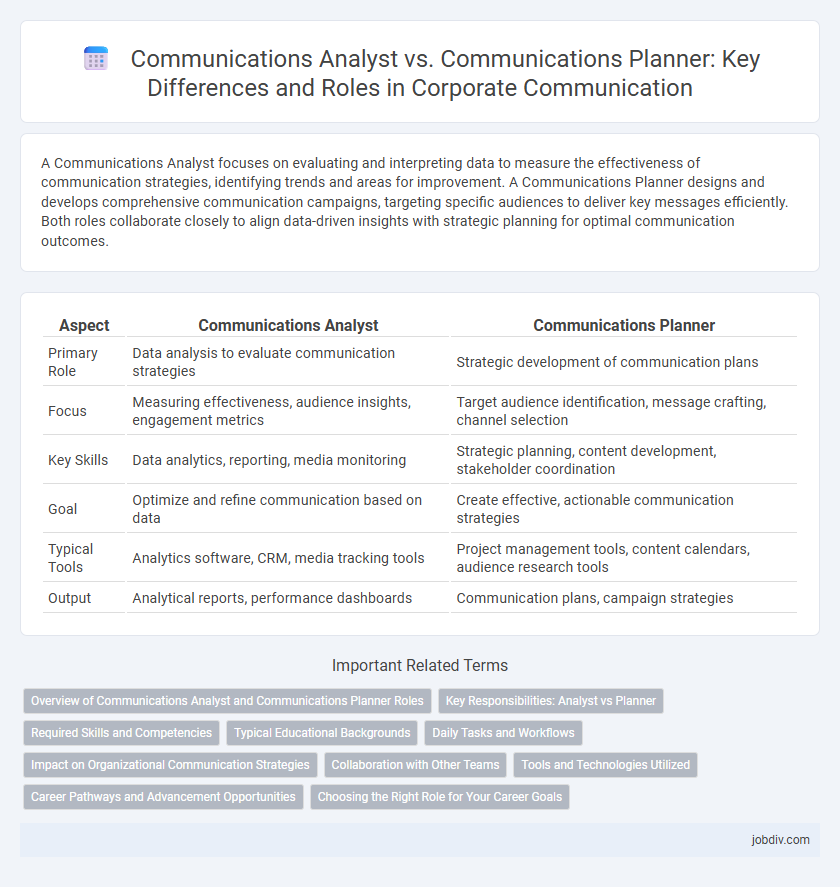A Communications Analyst focuses on evaluating and interpreting data to measure the effectiveness of communication strategies, identifying trends and areas for improvement. A Communications Planner designs and develops comprehensive communication campaigns, targeting specific audiences to deliver key messages efficiently. Both roles collaborate closely to align data-driven insights with strategic planning for optimal communication outcomes.
Table of Comparison
| Aspect | Communications Analyst | Communications Planner |
|---|---|---|
| Primary Role | Data analysis to evaluate communication strategies | Strategic development of communication plans |
| Focus | Measuring effectiveness, audience insights, engagement metrics | Target audience identification, message crafting, channel selection |
| Key Skills | Data analytics, reporting, media monitoring | Strategic planning, content development, stakeholder coordination |
| Goal | Optimize and refine communication based on data | Create effective, actionable communication strategies |
| Typical Tools | Analytics software, CRM, media tracking tools | Project management tools, content calendars, audience research tools |
| Output | Analytical reports, performance dashboards | Communication plans, campaign strategies |
Overview of Communications Analyst and Communications Planner Roles
Communications Analysts specialize in evaluating communication strategies through data analysis, audience research, and performance metrics to optimize message effectiveness. Communications Planners focus on developing comprehensive communication plans by identifying target audiences, setting objectives, and selecting appropriate media channels to ensure strategic messaging alignment. Both roles work collaboratively to enhance organizational communication but emphasize different aspects of planning and analysis for campaign success.
Key Responsibilities: Analyst vs Planner
Communications Analysts focus on data collection, performance metrics, and audience insights to evaluate the impact of communication strategies, ensuring messages resonate effectively with target groups. Communications Planners develop strategic communication plans, aligning messaging with organizational goals and selecting optimal channels and timing to maximize outreach and engagement. The Analyst's role is rooted in analysis and reporting, while the Planner emphasizes strategy formulation and campaign design for effective communication execution.
Required Skills and Competencies
Communications Analysts require strong data analysis, content evaluation, and reporting skills to interpret communication metrics and optimize strategy effectiveness. Communications Planners need expertise in strategic forecasting, campaign development, and audience segmentation to design comprehensive communication plans. Both roles demand excellent written and verbal communication, project management abilities, and proficiency with digital communication tools.
Typical Educational Backgrounds
Communications Analysts typically hold degrees in communications, journalism, or media studies, emphasizing data analysis and audience insights. Communications Planners often possess educational backgrounds in marketing, public relations, or strategic communication, focusing on campaign development and media strategy. Both roles require strong analytical and writing skills but diverge in their application of educational training toward data interpretation versus strategic planning.
Daily Tasks and Workflows
Communications Analysts focus on monitoring, analyzing, and interpreting data to measure the effectiveness of communication strategies, using tools like media monitoring software and analytics platforms to track key performance indicators. Communications Planners develop strategic communication plans, coordinate messaging across multiple channels, and collaborate with stakeholders to ensure consistent brand communication and audience engagement. Both roles require management of content schedules and reporting workflows, but Analysts emphasize data-driven insights while Planners prioritize strategic alignment and campaign execution.
Impact on Organizational Communication Strategies
Communications Analysts assess data and feedback to optimize message delivery and improve internal and external communication effectiveness, directly influencing organizational communication strategies. Communications Planners develop comprehensive communication plans by identifying target audiences, setting objectives, and coordinating messaging across multiple channels to ensure alignment with corporate goals. Both roles significantly impact organizational communication by leveraging data-driven insights and strategic planning to enhance engagement and brand reputation.
Collaboration with Other Teams
Communications Analysts gather and interpret data to inform messaging strategies by collaborating closely with marketing, sales, and data teams. Communications Planners coordinate cross-departmental efforts, aligning communications plans with business objectives through teamwork with creative, PR, and digital specialists. Both roles emphasize seamless collaboration to optimize communication effectiveness and drive cohesive organizational messaging.
Tools and Technologies Utilized
Communications Analysts utilize data analytics platforms, social media monitoring tools, and customer relationship management (CRM) software to assess communication effectiveness and audience engagement. Communications Planners focus on strategic planning software, project management tools, and content management systems (CMS) to develop, schedule, and coordinate communication campaigns. Both roles leverage digital analytics and collaboration tools but differ in their operational emphasis: analysis versus strategic execution.
Career Pathways and Advancement Opportunities
Communications Analysts specialize in data-driven evaluation of communication strategies, leveraging analytics to optimize messaging effectiveness and audience engagement. Communications Planners focus on designing comprehensive communication campaigns, integrating market research and strategic insights to align messaging with organizational goals and target demographics. Career advancement for Analysts often leads to roles in data strategy or digital marketing analytics, while Planners progress toward senior strategic roles such as Communications Director or Brand Strategist, emphasizing leadership and campaign orchestration.
Choosing the Right Role for Your Career Goals
Communications Analysts specialize in data interpretation, measuring campaign effectiveness, and generating actionable insights to optimize communication strategies. Communications Planners focus on designing and implementing strategic communication plans that align with organizational objectives and target audiences. Choosing between these roles depends on whether your career goals emphasize analytical skills and data-driven optimization or strategic planning and creative campaign development.
Communications Analyst vs Communications Planner Infographic

 jobdiv.com
jobdiv.com